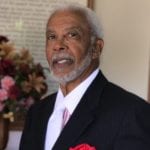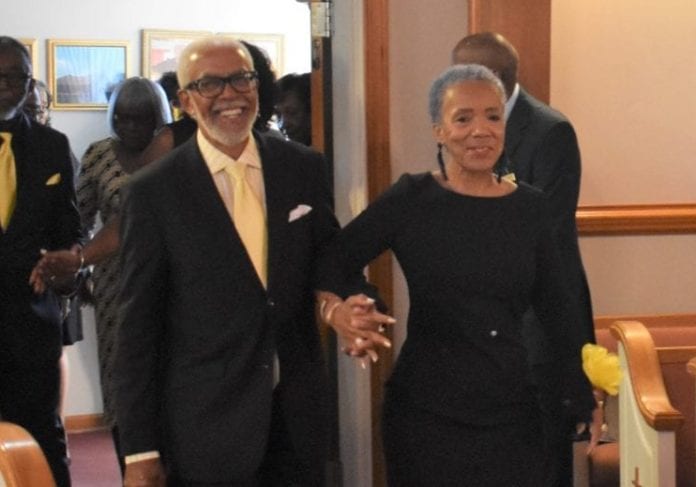“If Free Joe and the original church members could see us here today, they would be absolutely astounded. I think it would be unbelievable to them that we have progressed like we have from their humble beginnings,” said Pastor Leonard Dawson of Cane Creek Baptist Church.

(Photo: Dr. Sybil C. Mitchell)
“These ex-slaves would look in amazement at the progress we’ve made 159 years from the time they built their little, wooden church,” he said. “They, no doubt, had dreams for future generations and envisioned possibilities for a whole new world where black people enjoyed some of the luxuries and benefits that had long been denied them in slavery.”
Pastor Dawson and the nearly 300-member congregation marked the church’s 159th anniversary with a program that marked the occasion and a season of planning and future dreaming of their own. This summer’s event kicked off a future-centered focus, not only for the church, but for the life of its community.
“We are concerned about the decaying and deteriorating condition of the Bunker Hill community,” said Pastor Dawson. “We would like to see the revitalization of Bunker Hill. Over the years, there has been a constant neglect of our neighborhoods. Corner stores and businesses have long closed down. Blighted and run-down structures are almost more numerous than the homes that people actually live in.”
Dawson recalls the tremendous hope and promise church founders had for their little Cane Creek church. For ex-slaves, there was nowhere to go but up. Some written records are available regarding the life and work of church founder Joseph H. “Free Joe” Harris. But most of the growth and history has lived on over the generations through a strong, oral tradition.
Joseph H. “Free Joe” Harris (sometimes written as “Freejoe”) was born a slave on July 18, 1796, in Goochland County, Virginia. In 1829, when he was 33 years old, Freejoe became a Baptist minister. Three years later, he was emancipated. The circumstances of obtaining his freedom—whether he brought his own freedom, or his master let him go free—is unclear. He left Virginia and came to Eads, Tennessee in 1833 as one of the early pioneers of Fayette and Shelby Counties.
Freejoe purchased his wife, Fanny and baby daughter, Virginia, out of slavery in 1834. In 1835, he and Fanny became the first couple of color to marry in Shelby County, Tennessee. He was the first architect of color in Shelby County, Tennessee. He built the oldest brick structure currently standing in West Tennessee in 1834. It is located in Germantown, Tennessee.
Four years later, he built Bethany Christian Church in Eads. He seems to have taken on the ministry of building churches. But toward the end of 1838, he fled to Indiana with his young family to avoid “The Trail of Tears.”
(Whites called him DocJoe or Indian Joe. He had Native American ancestry, but why he was in danger of being a part of “Indian Removal” from Tennessee—or “The Trail of Tears”—is unknown.)
He returned to Eads in 1840 and became an agent for the Underground Railroad.
Freejoe opened a stagecoach line, “The Harris Line,” that ran from Bolivar, Tennessee to Memphis on the Memphis/Bolivar trail now known as Highway 64/Stage Road, with an occasional run to Jackson, Tennessee. Runaway slaves were hidden underneath his stagecoaches.
He built Gray’s Creek Missionary Baptist Church on February 15, 1843, in Eads. Today, it is the first and oldest African-American Church in rural Shelby County, Tennessee. A historical marker has been placed by the Shelby County, Tennessee Historical Commission.
Over the course of his life and ministry, Freejoe build Cane Creek Missionary Baptist Church along side a creek called Cane Creek, and pastored there for a number of years. He died on July 15, 1875, and is buried in Gray’s Creek Missionary Baptist Church cemetery, the oldest cemetery in Shelby County. A historical marker has been placed by the Shelby County Historical Commission.
Cane Creek grew and moved as its congregation grew and migrated from rural Shelby County into the city of Memphis. Today, it is the recently built church edifice on Elvis Presley Boulevard next to the U.S. Postal Service’s Bulk Mail Center.
“I hope to make our Life Center a hub for Bunker Hill community,” said Pastor Dawson. “We want to help make our people computer-literate, and I want to make an impact on Alzheimers for our elderly. That’s the legacy Freejoe left us—serving our community and loving its people. We want the spirit of his work to be kept alive at Cane Creek for the next 100 years.”




